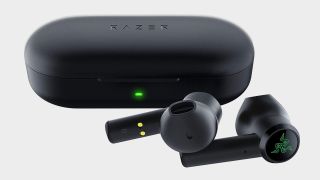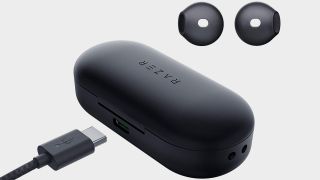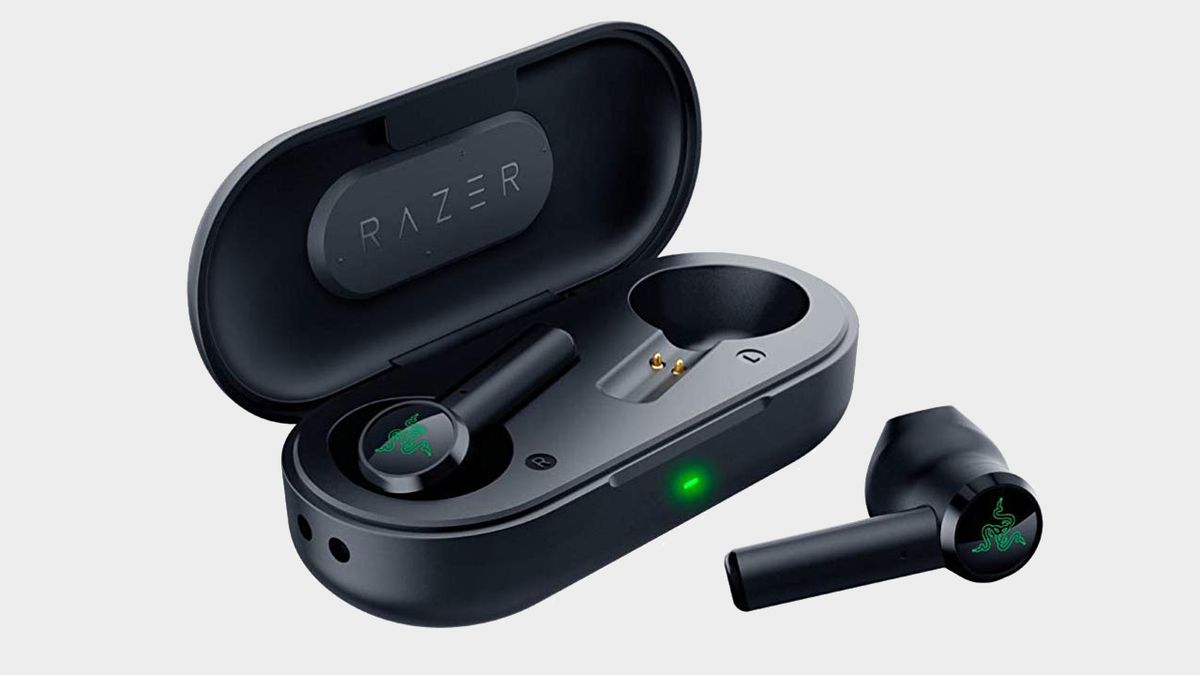GamesRadar+ Verdict
A sensibly priced alternative to the current big names in wireless earphones, the Razer Hammerhead True Wireless buds perform well and rock a sleek black look.
Pros
- +
Great visual design
- +
Sound quality is generally good
- +
Excellent value
Cons
- -
Bass isn’t too impressive
- -
Battery and Bluetooth could be better
- -
Touch controls are hit and miss
Why you can trust GamesRadar+
With the success of its PC headsets for gaming - some of which being contenders for the best gaming headsets - and mobile gaming once again on the rise, it was inevitable that Razer would release its own gaming-oriented entry into the wireless earphones market. The Razer Hammerhead true wireless earbuds are pitted against some stern competition in the likes of Apple’s AirPods and Sony’s high-end WF-1000XM3 buds, but they do make for a solid showing.
The Razer Hammerhead True Wireless earbuds are instantly recognisable as Razer hardware, with all-black plastic casing and a tiny Razer logo on the exterior of each bud. Coming in at the $100 / £100 mark they’re cheaper than their best-known competitors, and come equipped with low-latency technology that makes them ideal for gaming on mobile devices. While they might not be as flashy as the iconic AirPods, they bring solid all-around performance to the mid-point of the wireless earphone market.
Design
The Razer Hammerhead True Wireless earbuds come in a sleek pill-shaped carry case, which doubles as their charger (the case itself charges with an included USB-C cable). Unlike many other wireless earbuds, which have tall, thin cases into which the earbud arm slots, the Razer Hammerhead buds snap magnetically into place on their side. The case is thin and flat, making it easy to slip into your pocket.
The earbuds themselves are similarly compact, with a short arm and rounded interior. They’re also very lightweight, which means that they sit securely in the ear with little to no danger of falling out or aching your ears. The True Wireless buds are comfortable too, and don’t block out much exterior sound when no audio is playing. More importantly - to everyone around you, at least - very little noise bleeds out to the surrounding environment, meaning that the other people on the bus won’t have to listen to your character’s battle cry for the seventieth time that trip.
The only dash of colour on the buds - even the case is fully black, save for a tiny power LED - comes in the form of a green Razer logo imprisoned in a clear plastic disc on each exterior surface. These aren’t just for brand awareness, though; they’re touch buttons, allowing you to control your audio with a few quick taps. Neat.

Features
While those touchpads are responsive and make pairing the earbuds with a device very straightforward, they can be fiddly at times. I found that simple controls like volume, pausing music and answering hands-free calls were all consistent enough, but there’s a large variety of touch commands that were near impossible to properly memorise. Three quick taps to restart a song should be easy, but mess up the timing on those taps ever so slightly and you might find yourself skipping that track instead.
While it’s easy to just pair the buds using the Bluetooth shortcut, you can also download the Hammerhead companion app for your mobile device, which allows you to tweak a small range of settings and update the earbuds’ firmware when necessary. It’s a fairly stripped-back tool, a far cry from the cluttered irritation of Razer’s Synapse PC software, but I like it. The range of customisation options definitely could be broader, though.

The low-latency mode mentioned above comes with a speedy 60ms input latency, making audio almost seamless in both games and video content. It’s significantly faster than Apple’s AirPods, which clock in at around 120ms in real-time latency -Apple is not quite as forthcoming as Razer when it comes to hardware specs. While this might seem to be a huge win for the Razer Hammerhead True Wireless, in practice the difference in latency is barely noticeable. While cheaper wireless earphones and headsets (and often those designed purely for music playback) tend to have higher real-world latency of around 250ms, higher quality models are all so fast that any difference is imperceptible to most users.
The last nifty feature on display here is the integration of Bluetooth connectivity. Because of the default Bluetooth compatibility, these earbuds can be used on a PC or PS4 as well as mobile devices. On top of that, the case automatically switches on and connects the earbuds to a local paired device as soon as you open it. It’s a simple solution, but an undeniably elegant one.
Performance
Simply put, the sound quality is good - not outstanding, but good. The default EQ settings are certainly on par with similarly priced wireless earbuds, if not better. Games and movies sound great, with excellent sound clarity and good directional input, although music can be a little tinny.
Despite custom-tuned 13mm drivers, bass isn’t well-represented here, a clear indicator of Razer’s gaming roots. More emphasis on treble tones might mean that some bassier songs sound weaker, but it makes dialogue and sound effects crisp and clear. It also means that hands-free calls have great audio. Sadly, the Bass Boost EQ preset is fairly poor, making many tracks sound scratchy or even completely muffled. The opposite Treble Boost setting is less offensive, but also fails to impress. There’s no way to adjust the specs of these modes either, so I just stuck to the default EQ mode.
If you take your earphone audio very seriously, this probably isn’t the right product for you; stick to high-end audio brands like Sony and Sennheiser. For a spot of Fortnite on your phone, though, it’s great. Gunfire feels punchy and explosions are loud, and detecting an enemy via the sound of their footsteps is just as easy as when using a proper, over-ear gaming headset.

The battery life is decent, with the earbuds managing around three continuous hours of audio playback. If you’re looking for truly all-day battery life, this ain’t it, but fortunately the carry case can go for days without needing to be recharged. The main downside is that the case doesn’t charge the earbuds particularly fast; an hour in the case won’t get you a full battery from empty.
The Bluetooth connection is mostly stable - particularly after a firmware update - with a maximum range of 10m (though anything more than 4m resulted in disruption). Moving the paired device around did disrupt the connection on occasion; while I had no problems or signal drops when using the Razer Hammerhead buds while stationary, the connection would drop sometimes when walking around. Given its sole reliance on Bluetooth, it can get frustrating when in-game sound or music is being interrupted.
The microphone feels like something of an afterthought here, but it does work reasonably well. An omnidirectional pickup pattern means that using the tiny mic in noisy environments isn’t great, but the general sound quality is good enough for hands-free calls. We wouldn’t really recommend using it for online game chat, though; a proper headset or freestanding mic will outperform this any day of the week.
Overall - should you buy it?
If you’re looking for a mid-range pair of wireless earphones, the Razer Hammerhead True Wireless earbuds can scratch that itch. They’re not well suited to audiophiles, but provide solid performance and design quality at an undeniably great price. Given their niche and what they offer, they are certainly one of the Razer headsets going, too.
These are the AirPod antithesis; the perfect companion to a sleek black Android device - though you can still use them with iPhones, of course! If you like squeezing in a few fights on your phone on your lunch break, or are simply after a straightforward wireless setup for Netflix binges on the morning commute, the Razer Hammerhead earbuds are perfect.
For more Razer gear and advice check out our guides to Razer streaming and Razer laptops.
Christian is a writer for Maximum PC, but also writes in a freelance capacity for a number of other sites including GamesRadar, PC Gamer, and TechRadar. He knows the PC gaming space inside out, particularly when it comes to hardware including PC builds, keyboards, and other peripherals.
PlayStation cancels unannounced live-service God of War game from Demon's Soul Remake studio and live-service game from Day's Gone dev

Weapon X-Men writer says the high octane story is all about "blockbuster comics" - "Once again, it's time to show movies and video games how it's done"
David Lynch has died and I don't know what to do except thank him for nearly 50 years of ethereal TV and film
Most Popular

